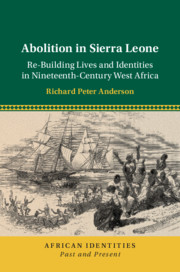Book contents
- Abolition in Sierra Leone
- African Identities: Past and Present
- Abolition in Sierra Leone
- Copyright page
- Dedication
- Contents
- Illustrations
- Acknowledgments
- Notes on the Text
- Abbreviations
- Introduction
- 1 Liberated African Origins and the Nineteenth-Century Slave Trade
- 2 Their Own Middle Passage
- 3 “Particulars of disposal”
- 4 Liberated African Nations
- 5 Kings and Companies
- 6 Religion, Return, and the Making of the Aku
- 7 The Cobolo War
- Conclusion
- Appendices
- Select Bibliography
- Index
3 - “Particulars of disposal”
Life and Labor after “Liberation”
Published online by Cambridge University Press: 09 January 2020
- Abolition in Sierra Leone
- African Identities: Past and Present
- Abolition in Sierra Leone
- Copyright page
- Dedication
- Contents
- Illustrations
- Acknowledgments
- Notes on the Text
- Abbreviations
- Introduction
- 1 Liberated African Origins and the Nineteenth-Century Slave Trade
- 2 Their Own Middle Passage
- 3 “Particulars of disposal”
- 4 Liberated African Nations
- 5 Kings and Companies
- 6 Religion, Return, and the Making of the Aku
- 7 The Cobolo War
- Conclusion
- Appendices
- Select Bibliography
- Index
Summary
Chapter 3 continues the narrative arc of Liberated Africans’ journeys from homeland to diaspora. It traces the settlement of “liberated” men, women, and children in the colony, emphasizing the cultural implications of particular settlement policies in operation at different times. Most Liberated Africans were sent to one of twenty-six villages established across the Sierra Leone peninsula in the vicinity of Freetown. The Liberated African registers record settlement for tens of thousands of Liberated Africans, allowing us to trace captives from particular ports and coastlines of embarkation to particular villages in Sierra Leone. This detailed documentation of settlement is unique within the African diaspora and offers insights into the quotidian interactions through which diasporic identities were born. New villages were often formed by a single group of shipmates. In short, the fictive community formed on the Atlantic voyage was made reality in the various villages of the Sierra Leone peninsula. Over time, multiple groups of shipmates increased the size and diversity of these villages. Each Liberated African became an African diaspora in microcosm within the broader context of a prototypical British post-slavery colony.
- Type
- Chapter
- Information
- Abolition in Sierra LeoneRe-Building Lives and Identities in Nineteenth-Century West Africa, pp. 96 - 126Publisher: Cambridge University PressPrint publication year: 2020

